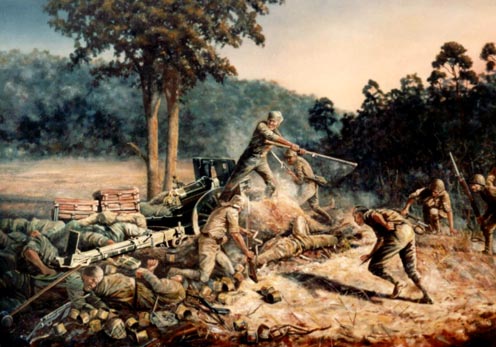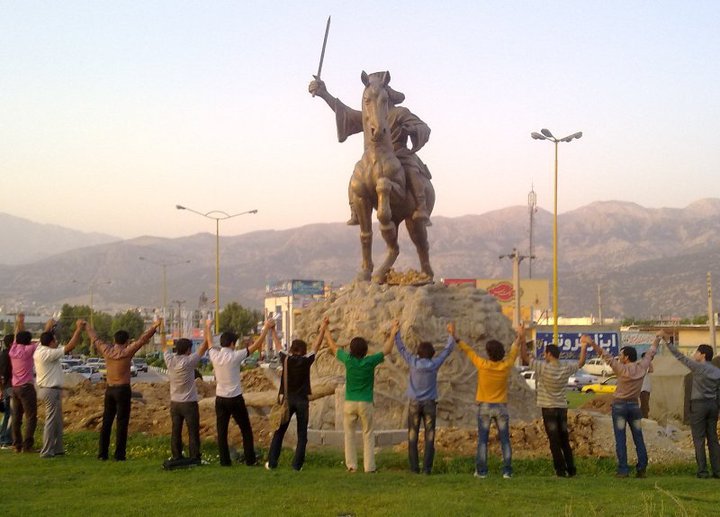On this day, November 18, exactly forty-seven years ago in 1962, 114 brave men of the 13th Kumaon Regiments Charlie company made the supreme sacrifice fighting the invading Chinese at Rezang La pass at 16000 feet near Chushul. This epic battle called the last stand when every soldier fought to his last breath was led by the legendary Major Shaitan Singh Bhati (IC 7990) of Jodhpur Rajasthan, who was later awarded the Param Veer Chakra, Indias highest gallantry award for conspicuous bravery or self sacrifice in the face of the enemy.
Charlie Company of 13 Kumaon was tasked with the defence of Rezang La, situated on the South East approach to the valley, town and airfield of Chushul in Ladakh. The Company area was defended by three platoon positions but the surrounding terrain isolated it from the rest of the Regiment. Their defensive positions were crested for Indian artillery, meaning, thereby that these troops could not hope for artillery fire support if and when needed as the artillery was behind a hill feature and could not train its guns on the target. The Chinese suffered no such disadvantage and brought on heavy artillery fire on the 13 Kumaons Charlie Company.
It was a cold winter morning at 16000 feet with icy winds howling through Rezang La
biting and benumbing. The expected Chinese attack came through a Nullah, a dry river bed, but was repulsed with heavy machine gun fire by the brave Ahirs of Charlie Company. The enemy regrouped and attacked again and again with ever more reinforcements and finally managed to overrun the position. 109 of the 123 Jawans (soldiers) were killed. Of the 14 survivors, nine were seriously wounded. Almost everyone had fought to the last round and killed many more enemy soldiers. One estimate of Chinese casualties is close to 500 killed and wounded.
Unmindful of own safety, Major Shaitan Singh, the Company Commander, went from post to post raising the morale of his men and continued to fight even after being seriously wounded. While he was being evacuated by two of his comrades, the Chinese brought heavy machine gun fire on them. Major Shaitan Singh sensed danger to their lives and ordered them to leave him to his fate. They placed him behind a boulder on the slopes of a hill, where he breathed his last and this is where he was found some days after the battle.
Maj. Gen. Ian Cardozo, himself a Vir Chakra winner, writes in his Param Vir Chakra, Our heroes in Battle, that When Rezang La was later revisited dead Jawans were found in the trenches still holding on to their weapons ... every single man of this company was found dead in his trench with several bullet or splinter wounds. The 2-inch mortar man died with a bomb still in his hand. The medical orderly had a syringe and bandage in his hands when the Chinese bullet hit him... Of the thousand mortar bombs with the defenders all but seven had been fired and the rest were ready to be fired when the (mortar) section was overrun".
Other heroes defending Rezang La who were awarded Veer Chakras were Naik Hukum Chand (posthumous), Naik Gulab Singh Yadav, Lance Naik Ram Singh (posthumous), Subedar Ram Kumar and Subedar Ram Chander. All hailed from the Revari district of Haryana where in Gudiani village stands a memorial for these brave sons of India.
Two of the most celebrated soldiers of the Kumaon Regiment, General K.S. Thimayya and General T.N. Raina who served as Chiefs of the Indian Army, have lauded this singular achievement. Thimayya noted: "I had said many years ago that the Army must have an Ahir Regiment. The supreme sacrifice of the Charlie Company has fulfilled my expectations. I hope a suitable memorial will be built in Ahirwal in their memory so that the generations to come may seek inspiration from the immense courage and valour of their forefathers. For his part, observed: You rarely come across such example in the annals of world military history when braving such heavy odds, the men fought till the last bullet and the last man .Certainly the Battle of Rezang La is such a shining example."
While recalling the 1962 conflict we often refer to Indias humiliating defeat at Chinese hands and forget that the Jawan of the Indian Army invariably fought with exceptional bravery and valour in the most trying conditions often without winter clothing and in some cases even without adequate ammunition.







